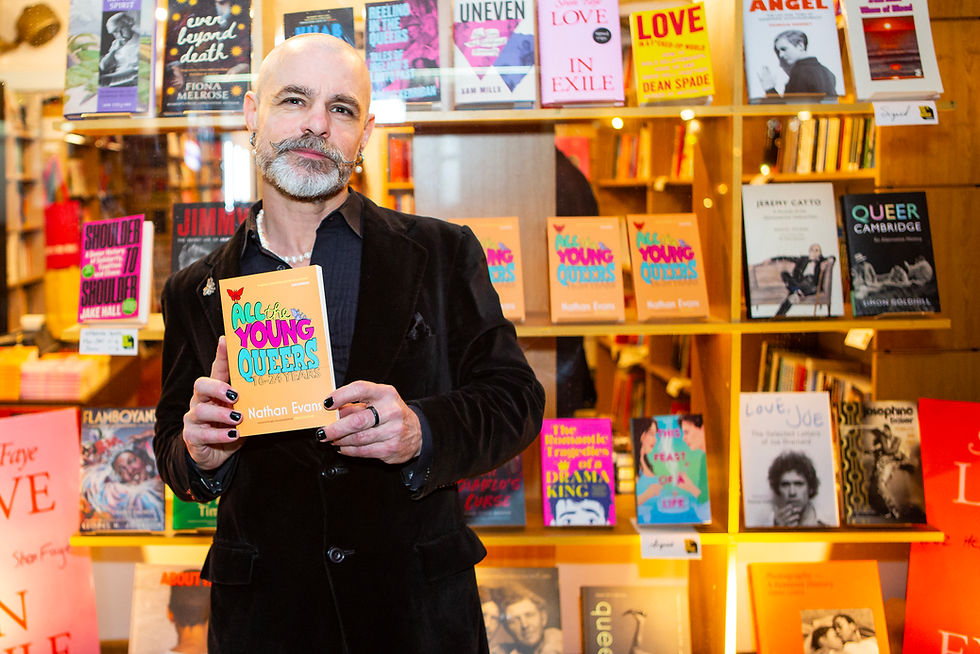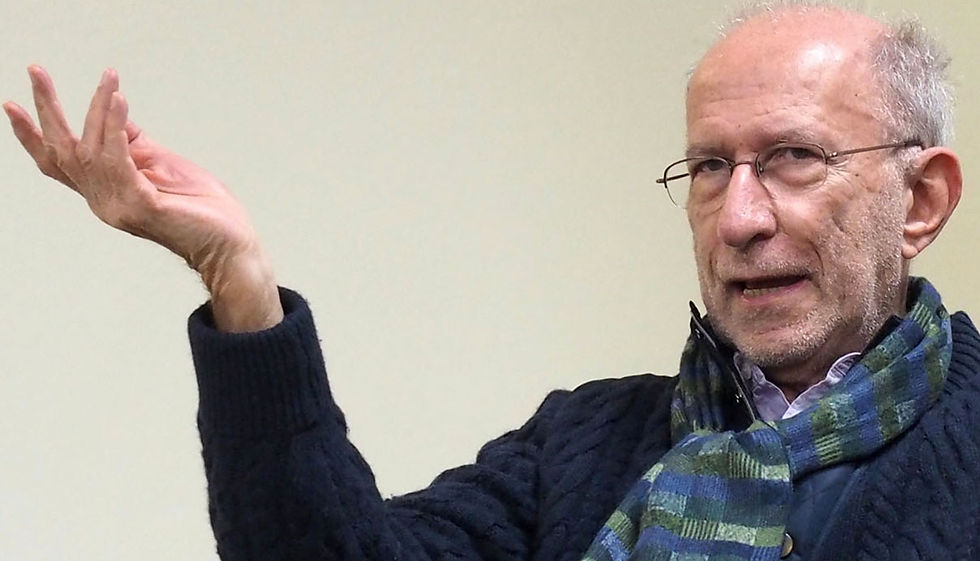Wright to Writer: Adam Zmith & Nathan Evans—Queer Youth: Stories and Reflections
- Inkandescent
- Feb 9
- 5 min read
Adam Zmith asks Nathan Evans about All the Young Queers: 16–24 Years

'I enjoyed playing with form: one of the stories is told through a message exchange on an unnamed hook-up app; another is told through letters, articles, and court documents.'
Adam Zmith: At what point in the writing of these stories did you conceive of them as a collection?
Nathan Evans: Many of these stories have had previous incarnations: the first, for instance, began as a monologue performed some time ago on the Edinburgh Fringe. I wanted it, and others like it, to have a new lease of life. When I gathered together the original materials, I realised they all had a young queer protagonist; the idea for the collection was born. Justin David at Inkandescent had been encouraging me to try my hand at fiction, but I didn’t have time to start reworking those materials until that first lockdown.
AZ: Why did you choose the ages 16 to 24 as the organising focus of the stories?
NE: 16–24 are ages that surveys often tickbox together, along with 25–34, 35–44, etc. These demarcations can seem pretty arbitrary, but it seems to me there is a human truth in the grouping of those youthful years: the mid-teens are when many of us become a quite separate (and often quite different) entity to our parents; in our mid-twenties, we may realise the world doesn’t revolve around us, and that we’re part of A Bigger Universe (which is title to the final story). There are nine stories—one for each of the ages between sixteen and twenty-four, each with a correspondingly-aged central character.
AZ: How did your own experiences at ages 16–24 inform the stories?
NE: It will not surprise you to know I have not been any of those ages any time this century, and yet I feel I still have something of the ‘young-adult’ in my psyche; it is perhaps for this reason I so enjoy engaging with my students at London Met University. Which is to say that some of the stories have very little to do with my own experiences (indeed, several are set in parallel universes), some use my experiences pretty tangentially, and a couple are completely autobiographical; which they may be, I leave with the reader.
AZ: What is society getting wrong about queer people aged 16–24 at the moment?
NE: I feel only a sixteen to twenty-four-year-old queer is able to answer that question, because surely one of the things society has done wrong over and again is projecting expectations and preconceptions onto our young humans; certainly that’s how it was, when I was young. Arguably, in the UK, things are rather better now than they were then—for a cis, white, gay man. Although, as proved by recent political developments and attacks on our trans siblings, we must never be complacent.
AZ: If you were 16 today, how do you think your life might pan out differently to how it has?
NE: When I was a young gay man, AIDS was a constant and Section 28, a constraint. On the face of it, my life might have been rather different—without the fear, the shame, the rejection which today’s young gay men do not, I believe, experience (in this country, at least) in the same way as those who went before them. Perhaps I might blossom early; perhaps I might not need all that therapy. Perhaps, perhaps, perhaps—in the words of Doris Day. Because perhaps a different set of problems might beset me: in current economic circumstances, would I—a boy from a very lower-middle-class family—even have gone to university (and to study an arts degree)?
AZ: Who's your favourite character in literature who's aged around 16-18?
NE: I have a soft spot for nineteen-year-old Raymond, in Willy Russell’s The Wrong Boy—a novel which takes the form of a series of letters to Morrissey. It’s a comic masterpiece but, as you might expect from the writer of Shirley Valentine and Educating Rita, there are depths beneath the surface hilarity and surreality: Russell really gets what it is to be an outsider (and a teenager) and above all, a fallible human being.
AZ: What gave you the most fun when you were writing these stories?
NE: Many of the stories are comedies; these are always fun (once you get them working). I also enjoyed playing with form: one of the stories is told through a message exchange on an unnamed hook-up app; another is told through letters, articles, and court documents. I think these are also fun for the reader: they have to join the dots up and, to an extent, tell the story for themselves.
AZ: A lot of the references, idioms and dialogue are rooted in Britain – how do you feel about being referred to as a keen observer of British life?
NE: Flattered? Hopeful this doesn’t mean my international career is dead-in-the-water? I think one of the benefits of being queer is the ability to see things from the outside in, and thereby gain some understanding of why people are doing the things they’re doing.
AZ: If you were appointed Minister for Young People, what would you do in that job?
NE: Nothing—until I’d appointed an advisory panel of the still actively youthful. Then, I would hope to use whatever understanding I have gained to action the things they felt would make the world better for them.
Nathan Evans lives and works in London. His short fiction has been anthologized by Muswell Press (Queer Life, Queer Love) and published in Queerlings magazine. His poetry has been published by Fourteen Poems, Broken Sleep, Dead Ink, Impossible Archetype, Manchester Metropolitan University and Royal Society of Literature. His collection Threads was long-listed for the Polari First Book Prize, his second collection CNUT is published by Inkandescent. He was long-listed for the 2020 Live Canon Poetry Competition and shortlisted for the Carlo Annoni Prize 2020 for his play SwanSong. His work in theatre and film has been funded by Arts Council England, toured with the British Council, archived in the British Film Institute, broadcast on Channel 4 and presented at venues including Royal Festival Hall and Royal Vauxhall Tavern.

Adam Zmith is a writer. He was the recipient of the London Writers Award 2019-20, and is the author of several shortlisted and published short stories. He is also one of the producers of The Log Books podcast, winner of Gold in the Best New Podcast category at the British Podcast Awards 2020.
Nathan Evans outside Gays the Word Bookshop in Bloomsbury, London, at the launch of All the Young Queers








sd